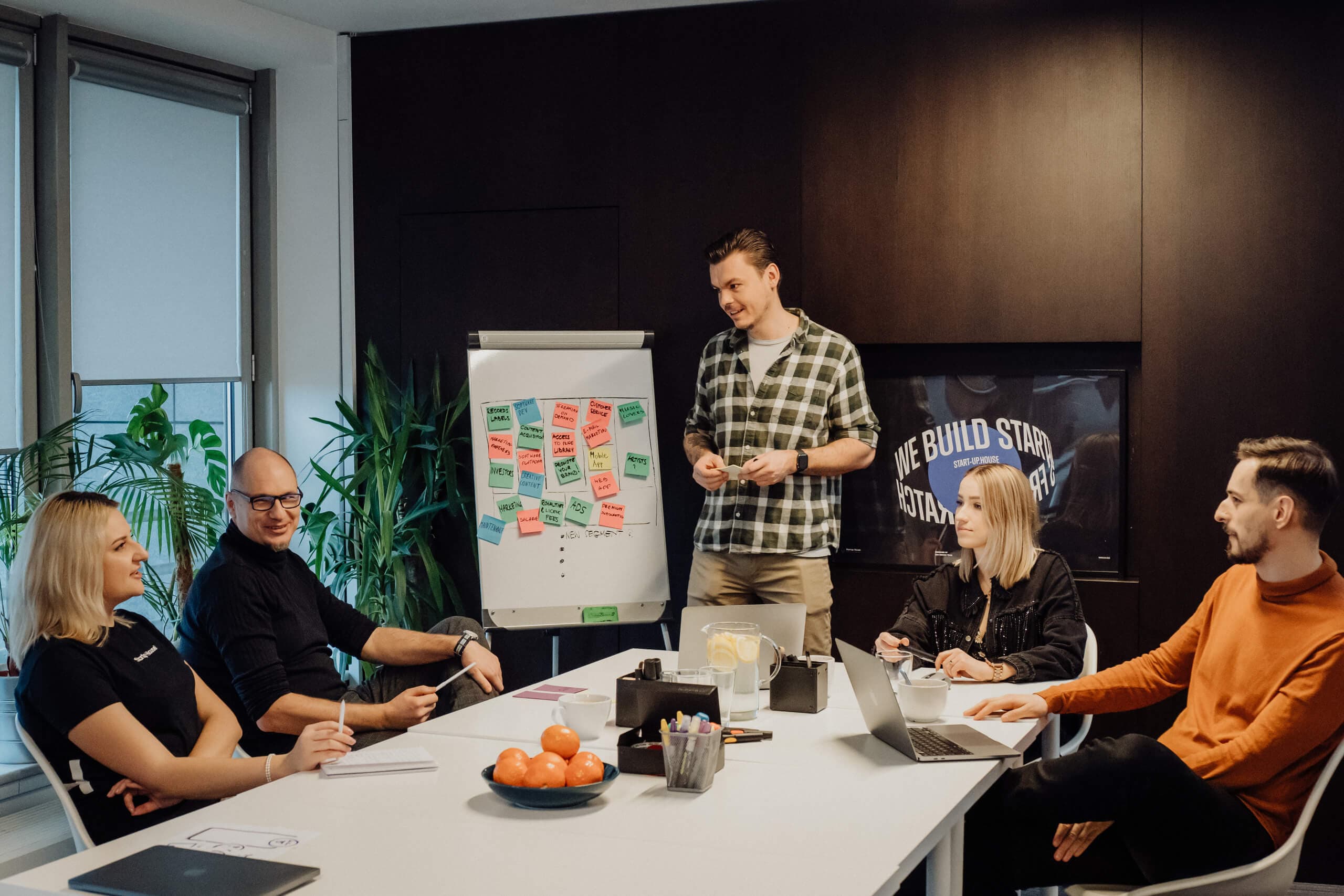Top 5 Automotive Industry Startups Making Waves
Marek Pałys
Feb 26, 2024・11 min read
Table of Content
Introduction to Automotive Startups
Automotive Industry's Rise to Startup Scene
Importance of Automotive Startups
Top 5 Automotive Startups To Watch
Startup 1: Changing the Automotive Landscape
Startup 2: Powering Progress with Innovation
Startup 3: Disrupting the Status Quo
Startup 4: Startup Driven by Technology
Startup 5: The Future of Automotive Industry
The Impact of These Startups
Shaking Up the Automotive Industry
Creating Competitive Advantages in the Market
Looking to the Future of Automotive Startups
Future Trends in the Automotive Startup Scene
Preparing for the Next Automotive Revolution
The automotive industry is witnessing a wave of innovation and disruption with the rise of startups that are reshaping the future of transportation. These dynamic young companies are bringing fresh ideas, cutting-edge technology, and sustainable solutions to the sector, challenging the traditional automotive giants. From electric vehicles to autonomous driving systems, these startups are pushing boundaries and driving change in the industry. Stay tuned as we delve into the top 5 automotive industry startups that are making waves, revolutionising the way we think about mobility and setting new standards for the road ahead.
Introduction to Automotive Startups
Automotive Industry's Rise to Startup Scene
The shift towards startups in the automotive sector is a response to a world demanding innovative mobility solutions. These enterprises have surged in prominence as technology has advanced, making what was once the realm of larger corporations accessible to smaller, nimble players. The rise of digital technology, particularly in the realms of artificial intelligence, machine learning, and battery technology, has levelled the playing field. This environment has enabled automotive industry startups to address niche markets, respond quickly to customer demands, and innovate at a pace that traditional car manufacturers often can't match. The result is a burgeoning startup scene that is not only contributing to but also prompting significant shifts in the automotive landscape.
Importance of Automotive Startups
Automotive startups play a crucial role in the industry by injecting a spirit of entrepreneurship and innovation. They are important for several reasons. Firstly, they contribute to the diversification of the market, offering consumers more choice and pushing the boundaries of what's possible in automotive technology. Secondly, these startups are pivotal in driving sustainability within the industry, often focusing on electric vehicles and other eco-friendly innovations. Furthermore, their agility allows them to adapt quickly to changing market needs and technological advancements. This responsiveness is essential in an industry undergoing rapid transformation due to environmental concerns and the shift towards smart cities. Lastly, automotive startups create jobs and stimulate economic growth, while also providing established companies with fresh perspectives and potential partnerships.
Top 5 Automotive Startups To Watch
Startup 1: Changing the Automotive Landscape
Startup 1 is at the forefront of redefining the automotive landscape, leveraging cutting-edge technology to challenge the norms of vehicle design and functionality. With a focus on sustainability, they are pioneering the development of electric vehicles that don't compromise on performance or comfort. Their innovative use of materials and commitment to reducing the carbon footprint of their vehicles sets them apart in an industry under pressure to mitigate environmental impacts. The startup's approach to manufacturing and supply chain management also reflects a modern ethos that prioritises efficiency and lean operations. Startup 1's vision extends beyond just producing vehicles; they aim to transform the entire experience of car ownership, making it more connected and integrated with the digital lives of consumers.
Startup 2: Powering Progress with Innovation
Startup 2 is powering progress in the automotive industry with a focus on innovation in energy storage and efficiency. Understanding the critical role of batteries in the future of transport, this startup is developing advanced battery technologies that promise longer ranges and faster charging times for electric vehicles. Their work doesn't stop at just improving existing solutions; they are exploring new materials and chemistries to leapfrog the limitations of current battery systems. By doing so, they aim to make electric vehicles more accessible and practical for everyday use. Their dedication to research and development has attracted attention from industry leaders, reflecting the potential impact of their breakthroughs on the global market. Startup 2 is not merely evolving with the industry—it's actively propelling it forward into a new era of energy efficiency and sustainability.
Startup 3: Disrupting the Status Quo
Startup 3 is a true disruptor in the automotive industry, taking on the challenge of autonomous driving technology. Their systems are designed to make self-driving cars a reality for the mainstream market. They are developing sophisticated algorithms and sensor technologies that allow vehicles to navigate complex environments safely and efficiently. This startup's approach is not just about creating autonomy in cars; it's also about integrating these vehicles into the wider transport ecosystem. They are working on solutions that enable cars to communicate with each other and with infrastructure, aiming to reduce traffic congestion and improve road safety. The potential of Startup 3's technology stretches beyond personal transportation, as it can be adapted for use in commercial fleets, reducing operating costs and revolutionising logistics. Their bold vision is setting the course for a future where cars are not just self-driven, but are part of a connected and intelligent transportation network.
Startup 4: Startup Driven by Technology
Startup 4 distinguishes itself through its technology-driven approach to revolutionise vehicle connectivity and on-board experiences. The startup's core product is an advanced infotainment system that seamlessly integrates with users' digital lives, offering a level of personalisation and interactivity that goes beyond the industry standard. Their platform uses machine learning to adapt to driver preferences and habits, improving the overall driving experience while also enhancing safety with proactive alerts and assistance features. Beyond infotainment, Startup 4's technology suite includes vehicle-to-everything (V2X) communication capabilities, enabling cars to interact with city infrastructure and other vehicles to optimise traffic flow and increase situational awareness. With a commitment to pushing the boundaries of what's possible inside the car, Startup 4 is making significant contributions to the development of smarter, more connected vehicles.
Startup 5: The Future of Automotive Industry
Startup 5 is shaping the future of the automotive industry by focusing on the integration of vehicles into the broader scope of urban mobility. Their initiatives include the development of shared vehicle platforms that cater to the rising trend of the sharing economy. They're not just creating cars; they're creating a service that enables users to access transportation on demand, reducing the need for personal car ownership. Their technology supports this shift by providing robust fleet management tools and user-friendly apps that make car-sharing convenient and reliable. Moreover, Startup 5 is exploring the incorporation of alternative propulsion systems, such as hydrogen fuel cells, to push the envelope of eco-friendly travel. Their vision is a future where mobility is a service that's efficient, sustainable, and seamlessly integrated into city life, representing a paradigm shift in how we think about personal transport.
The Impact of These Startups
Shaking Up the Automotive Industry
The influence of these startups is undeniable; they are vigorously shaking up the automotive industry. By introducing groundbreaking technologies and fresh business models, they are forcing traditional manufacturers to rethink their strategies. They have heightened the competition, accelerated innovation, and increased the pace of change within the industry. Startups are not just filling gaps in the market; they are creating new niches and opportunities, driving the demand for advanced automotive technologies. Their bold approaches to design, production, and consumer engagement reflect a new era of automotive development. The ripple effect is significant, leading to increased investment in research and development across the entire industry. Furthermore, these startups are transforming consumer expectations, who now demand more from their vehicles in terms of connectivity, environmental impact, and overall experience.
Creating Competitive Advantages in the Market
Automotive industry startups are not just changing the game; they're also creating competitive advantages in the market. Their lean structures allow for rapid decision-making and implementation, a stark contrast to the often slow-moving giants of the industry. Startups are capitalising on this by bringing innovations to market at an unprecedented pace. They harness data analytics and customer insights to tailor their offerings, making them more appealing to a market that craves personalisation. Moreover, their emphasis on sustainability and eco-friendly practices is not merely a response to regulatory pressures; it's an intrinsic part of their value proposition. This focus resonates with a growing segment of environmentally conscious consumers. The agility and forward-thinking mindset of these startups have set a new standard, compelling established companies to adapt and innovate or risk being left behind.
Looking to the Future of Automotive Startups
Future Trends in the Automotive Startup Scene
The automotive startup scene is poised to continue its trajectory of rapid innovation and influence. Future trends suggest an even greater emphasis on sustainability, with startups likely to pioneer the development of new materials and fuel alternatives that further reduce the environmental impact of vehicles. Connectivity is another area set for exponential growth, with startups at the helm of integrating cars into the Internet of Things, making them part of a connected ecosystem that includes smart homes and cities. The evolution of autonomous driving technology will also continue, with startups striving to overcome the remaining technical and regulatory hurdles to make self-driving vehicles a common sight on roads. Finally, we can expect to see a surge in the creation of mobility-as-a-service platforms, challenging traditional car ownership models and offering more flexible, efficient, and cost-effective transportation options.
Preparing for the Next Automotive Revolution
As the automotive sector braces for the next revolution, startups are already laying the groundwork for transformation. They are fostering partnerships with technology companies, governments, and each other to drive innovation and navigate the evolving regulatory landscape. Preparing for the future involves investing in smart infrastructure and developing platforms that can support the new wave of electric and autonomous vehicles. Startups are also focusing on scalability, ensuring that their solutions can meet the demands of a global market. Education and talent acquisition are priorities as well, as a skilled workforce is essential to sustain growth and innovation. The next automotive revolution will likely be defined by a collaborative approach, where startups, incumbents, and other stakeholders work together to create an integrated, sustainable, and customer-focused mobility ecosystem.
Digital Transformation Strategy for Siemens Finance
Cloud-based platform for Siemens Financial Services in Poland


You may also like...

Unlocking Speed: How Agile Methodology Transforms Rapid Prototyping at Startup House
Agile methodology accelerates rapid prototyping at Startup House, helping ideas turn into products faster.
Alexander Stasiak
Apr 23, 2025・15 min read

How a Full-Service Software House Accelerates Product Development
A full-service software house gives you everything you need to launch fast — design, development, QA, DevOps — all under one roof. Here’s how it accelerates your product success.
Alexander Stasiak
Jul 03, 2025・7 min read

The Innovation Product Life Cycle: Phases and Strategic Insights
Mastering the innovation product life cycle—from ideation to renewal—gives businesses a competitive edge in a fast-evolving market. This guide unpacks each phase and offers strategic insights to help you plan, adapt, and thrive.
Alexander Stasiak
Jun 24, 2025・10 min read
Let’s build your next digital product — faster, safer, smarter.
Book a free consultationWork with a team trusted by top-tier companies.








